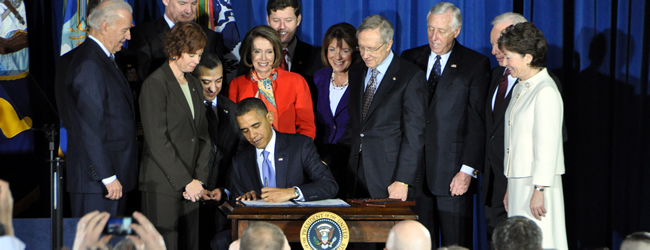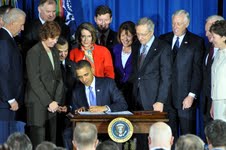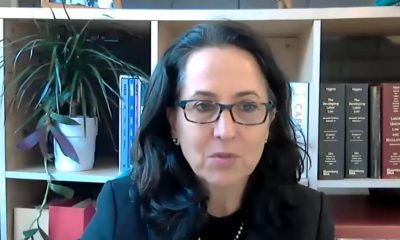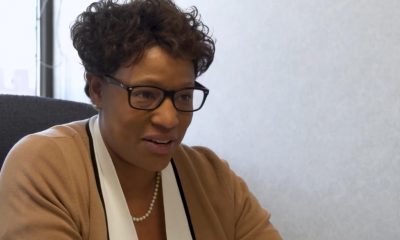National
HISTORIC: Obama signs ‘Don’t Ask’ repeal
Implementation process for open service must follow

The long fight to end a 17-year-old law barring open gays from serving in the U.S. military culminated in a significant milestone on Wednesday when President Obama signed into law a bill allowing for repeal of “Don’t Ask, Don’t Tell.”
Prior to the signing, Obama said the legislation will strengthen national security and “uphold the ideals that our fighting men and women risk their lives to defend.”
“No longer will our country be denied the service of thousands of patriotic Americans who are forced to leave the military, regardless of their skills, no matter their bravery or their zeal, no matter their years of exemplary performance because they happen to be gay,” Obama said.
During his remarks, the president also seemed to address those who have concerns about openly gay and lesbian people serving in the U.S. military to allay worries about the change to come.
“Now, with any change, there’s some apprehension,” Obama said. “That’s natural. But as commander-in-chief, I am certain that we can affect this transition in a way that only strengthens our military readiness; that people will look back on this moment and wonder why it was ever a source of controversy in the first place.”
The president signed the legislation in an auditorium at the Department of Interior before an audience of about 500 invitees that included both gay rights supporters and U.S. lawmakers such as Sens. Kirsten Gillibrand (D-N.Y.) and Mark Udall (D-Colo.) as well as gay Reps. Barney Frank (D-Mass.) and Jared Polis (D-Colo.).
Flanking Obama during the signing were gay former service members — Marine Staff Sgt. Eric Alva and Navy Cmdr. Zoe Dunning — as well as lawmakers who worked to pass the legislation, such as Rep. Patrick Murphy (D-Pa.), Sen. Joseph Lieberman (I-Conn.), House Speaker Nancy Pelosi (D-Calif.), Senate Majority Leader Harry Reid (D-Nev.) and Sen. Susan Collins (R-Maine). Chairman of the Joint Chiefs of Staff Adm. Mike Mullen, who has testified before Congress in favor of open service, was also behind the president during the signing.
When he finished signing the bill, Obama declared, “This is done!” and embraced those who were with him on stage as the audience chanted, “U-S-A! U-S-A!”
Prior to the signing, Vice President Joseph Biden told the audience that the legislative repeal of “Don’t Ask, Don’t Tell” marks the fulfillment of the one of the promises to the LGBT community on which he and Obama campaigned in 2008.
“This fulfills an important campaign promise the president and I made, and many here on this stage made, and many of you have fought for, for a long time, in repealing a policy that actually weakens our national security, diminished our ability to have military readiness, and violates the fundamental American principle of fairness and equality — that exact same set of principles that brave gay men and women will now be able to openly defend around the world,” he said.
President Obama signed the bill after the U.S. Senate on Saturday voted to approve the legislation, 65-31. All Democrats who were present voted in favor of the bill; Sen. Joe Manchin (D-W.Va.) didn’t vote. Eight Republicans voted in favor of the legislation: Collins, Sen. Olympia Snowe (R-Maine), Sen. Scott Brown (R-Mass.), Sen. Lisa Murkowski (R-Alaska), Sen. Mark Kirk (R-Ill.), Sen. George Voinovich (R-Ohio), Sen. John Ensign (R-Nev.) and Richard Burr (R-N.C.).
Gay service members discharged under “Don’t Ask, Don’t Tell” who were present in the audience during the signing told the Washington Blade that the occasion overwhelmed them with joyous feelings.
Stacey Vasquez, an Army paralegal who was discharged under “Don’t Ask, Don’t Tell” in 2003, said she was waiting for the moment “for so many years” and she couldn’t be happier.
“I had moments where I had my doubts of whether we were going to make it or not, but we were on the Hill every single day working on this,” Vasquez said. “People were very responsive to our stories about being discharged and why the law was unfair. It was just a matter of getting past the politics.”
Maj. Margaret Witt, an Air Force service member who last month became the first gay person discharged under “Don’t Ask, Don’t Tell” to be reinstated in the military by court order, said the moment of the bill signing will “go down in history.”
“I’m really happy to be here and hopefully carry the spirit of all those who are out there serving today,” Witt said. “It took years — years and years of really hard work and dedication.”
C. Dixon Osburn, who co-founded Servicemembers Legal Defense Network in 1993, said he was feeling “euphoria” following the bill signing and called the moment “the most significant advance in LGBT equality ever.”
“I think when you reduce it down to its essential — the young man and lesbian is not going to have to call SLDN hiding, quivering, wondering if they’re going to jail or if their career is going to be over the next day,” Osburn said. “America is now going to be with them for the first time, and they can serve with honor and integrity. Multiply that by a million, and that’s the significant change that we have today.”
Even though Obama has signed the legislation, repeal won’t take effect immediately. Language in the bill states that open service won’t be implemented until the president, the defense secretary and the chair of the Joint Chiefs certify that the U.S. military is ready for repeal.
There is no set deadline for when this certification must happen. Defense Secretary Robert Gates has said he wants to first institute training to facilitate open service before issuing certification.
After certification, an additional 60-day waiting period for congressional review must pass before “Don’t Ask, Don’t Tell” is officially off the books and gays can serve openly without fear of discharge.
During his remarks, Obama said he’s spoken with the military service chiefs about implementing the change and expects that it will be done quickly.
“I have spoken to every one of the service chiefs and they are all committed to implementing this change swiftly and efficiently,” Obama said. “We are not going to be dragging our feet to get this done.”
On Wednesday, White House Press Secretary Robert Gibbs said during a news conference that the president believes implementation of repeal of “Don’t Ask, Don’t Tell” would be “a matter of months.”
Aubrey Sarvis, SLDN’s executive director, has been pushing for certification to happen in a matter of weeks so that open service can begin in the first quarter of next year. He added that his organization will be “looking closely” at the new regulations that the Pentagon issues on gays in the military following certification.
“The regulations will be critical,” he said. “We’ll be working closely with [the Defense Department] on that and at SLDN, I think, our key role in 2011 — and probably the following year — will be oversight. Oversight of how the regulations are issued [and] oversight on how they are administrated.”
Even though the president has signed the bill into law, opponents of open service in the military continue to pursue avenues to block “Don’t Ask, Don’t Tell” repeal before it’s implemented.
On Tuesday, Senate Minority Leader Mitch McConnell tried to attach an amendment to the fiscal year 2011 defense authorization bill pending before the Senate to expand the certification responsibilities to include the military service chiefs. Since many of the chiefs have expressed opposition to open service at this time, such a measure could have delayed implementation indefinitely.
However, the amendment was blocked on Tuesday after Sen. Joseph Lieberman (I-Conn.), the sponsor of repeal legislation in the Senate, objected to the measure.
Sarvis said there is “room for mischief” as long as certification is outstanding because opponents of “Don’t Ask, Don’t Tell” repeal could continue to propose similar amendments that would meddle with the process.
“No one should be mistaken that opponents will try to undo this before it gets off the ground,” Sarvis said.
Legislative repeal of “Don’t Ask, Don’t Tell” was one of President Obama’s major promises to the LGBT community, but a number of gay rights supporters say they are expecting more from him during his presidency.
John Aravosis, the gay editor of Americablog, said repeal of “Don’t Ask, Don’t Tell” is but one item crossed off the list and other promises are still outstanding, such as repeal of the Defense of Marriage Act and passage of the Employment Non-Discrimination Act.
“By now, I was expecting ENDA passed and [‘Don’t Ask, Don’t Tell’] repealed, with a promise to get to DOMA soon,” Aravosis said.” We still have to wait until next year to see whether [‘Don’t Ask, Don’t Tell’] is truly and fully repealed, and forget about ENDA and DOMA for years to come. I’m glad the [‘Don’t Ask, Don’t Tell’] legislation passed this weekend, and I’m glad the president finally got engaged. But we are at best getting one of the three big civil rights promises the president made to us, and that’s it for a long time coming.”
Dan Choi, an Iraq war veteran discharged under “Don’t Ask, Don’t Tell” who has chained himself to the White House in protest over the law, also said he wants more from Obama.
Asked by the Blade what his feelings were during the signing, Choi replied, “I want to get married — that’s my feeling,” referencing Obama’s opposition to same-sex marriage.
“I think today is a day that we can applaud him for signing it, and I recognize that it wouldn’t have been signed by his opponents, and I cheer for him and our hearts are with him,” Choi said. “This morning was historic, but this afternoon we start planning on how to hold him accountable for all the other promises and all the other things that we deserve as citizens.”
State Department
State Department releases annual human rights report
Antony Blinken reiterates criticism of Uganda’s Anti-Homosexuality Act

Secretary of State Antony Blinken on Monday once again reiterated his criticism of Uganda’s Anti-Homosexuality Act upon release of the State Department’s annual human rights report.
“This year’s report also captures human rights abuses against members of vulnerable communities,” he told reporters. “In Afghanistan, the Taliban have limited work opportunities for women, shuttered institutions found educating girls, and increasing floggings for women and men accused of, quote, ‘immoral behavior,’ end quote. Uganda passed a draconian and discriminatory Anti-Homosexuality Act, threatening LGBTQI+ individuals with life imprisonment, even death, simply for being with the person they loved.”
Ugandan President Yoweri Museveni last May signed the law, which contains a death penalty provision for “aggravated homosexuality.”
The U.S. subsequently imposed visa restrictions on Ugandan officials and removed the country from a program that allows sub-Saharan African countries to trade duty-free with the U.S. The World Bank Group also announced the suspension of new loans to Uganda.
Uganda’s Constitutional Court earlier this month refused to “nullify the Anti-Homosexuality Act in its totality.” More than a dozen Ugandan LGBTQ activists have appealed the ruling.
Clare Byarugaba of Chapter Four Uganda, a Ugandan LGBTQ rights group, on Monday met with National Security Council Chief-of-Staff Curtis Ried. Jay Gilliam, the senior LGBTQI+ coordinator for the U.S. Agency for International Development, in February traveled to Uganda and met with LGBTQ activists who discussed the Anti-Homosexuality Act’s impact.
“LGBTQI+ activists reported police arrested numerous individuals on the basis of their sexual orientation or gender identity and subjected many to forced anal exams, a medically discredited practice with no evidentiary value that was considered a form of cruel, inhuman, and degrading treatment and could amount to torture,” reads the human rights report.
The report, among other things, also notes Ugandan human rights activists “reported numerous instances of state and non-state actor violence and harassment against LGBTQI+ persons and noted authorities did not adequately investigate the cases.”
Report highlights anti-LGBTQ crackdowns in Ghana, Hungary, Russia
Ghanaian lawmakers on Feb. 28 approved the Promotion of Proper Human Sexual Rights and Ghanaian Family Values Bill. The country’s president, Nana Akufo-Addo, has said he will not sign the measure until the Ghanaian Supreme Court rules on whether it is constitutional or not.
The human rights report notes “laws criminalizing consensual same-sex sexual conduct between adults” and “crimes involving violence or threats of violence targeting lesbian, gay, bisexual, transgender, queer or intersex persons” are among the “significant human rights issues” in Ghana.
The report documents Hungarian Prime Minister Viktor Orbán and members of his right-wing Fidesz party’s continued rhetoric against “gender ideology.” It also notes Russia’s ongoing crackdown against LGBTQ people that includes reports of “state actors committed violence against LGBTQI+ individuals based on their sexual orientation or gender identity, particularly in Chechnya.”
The report specifically notes Russian President Vladimir Putin on July 24 signed a law that bans “legal gender recognition, medical interventions aimed at changing the sex of a person, and gender-affirming care.” It also points out Papua New Guinea is among the countries in which consensual same-sex sexual relations remain criminalized.

The Cook Islands and Mauritius in decriminalized homosexuality in 2023.
The report notes the Namibia Supreme Court last May ruled the country must recognize same-sex marriages legally performed outside the country. The report also highlights the Indian Supreme Court’s ruling against marriage equality that it issued last October. (It later announced it would consider an appeal of the decision.)
Congress requires the State Department to release a human rights report each year.
The Biden-Harris administration in 2021 released a memorandum that committed the U.S. to promoting LGBTQ+ and intersex rights abroad.
The full report can be read here.
National
Same-sex couples vulnerable to adverse effects of climate change
Williams Institute report based on Census, federal agencies

A new report by the Williams Institute at the UCLA School of Law finds that same-sex couples are at greater risk of experiencing the adverse effects of climate change compared to different-sex couples.
LGBTQ people in same-sex couple households disproportionately live in coastal areas and cities and areas with poorer infrastructure and less access to resources, making them more vulnerable to climate hazards.
Using U.S. Census data and climate risk assessment data from NASA and the Federal Emergency Management Agency, researchers conducted a geographic analysis to assess the climate risk impacting same-sex couples. NASA’s risk assessment focuses on changes to meteorological patterns, infrastructure and built environment, and the presence of at-risk populations. FEMA’s assessment focuses on changes in the occurrence of severe weather events, accounting for at-risk populations, the availability of services, and access to resources.
Results show counties with a higher proportion of same-sex couples are, on average, at increased risk from environmental, infrastructure, and social vulnerabilities due to climate change.
“Given the disparate impact of climate change on LGBTQ populations, climate change policies, including disaster preparedness, response, and recovery plans, must address the specific needs and vulnerabilities facing LGBTQ people,” said study co-author Ari Shaw, senior fellow and director of international programs at the Williams Institute. “Policies should focus on mitigating discriminatory housing and urban development practices, making shelters safe spaces for LGBT people, and ensuring that relief aid reaches displaced LGBTQ individuals and families.”
“Factors underlying the geographic vulnerability are crucial to understanding why same-sex couples are threatened by climate change and whether the findings in our study apply to the broader LGBTQ population,” said study co-author Lindsay Mahowald, research data analyst at the Williams Institute. “More research is needed to examine how disparities in housing, employment, and health care among LGBT people compound the geographic vulnerabilities to climate change.”
Read the report
Federal Government
Lambda Legal praises Biden-Harris administration’s finalized Title IX regulations
New rules to take effect Aug. 1

The Biden-Harris administration’s revised Title IX policy “protects LGBTQ+ students from discrimination and other abuse,” Lambda Legal said in a statement praising the U.S. Department of Education’s issuance of the final rule on Friday.
Slated to take effect on Aug. 1, the new regulations constitute an expansion of the 1972 Title IX civil rights law, which prohibits sex-based discrimination in education programs that receive federal funding.
Pursuant to the U.S. Supreme Court’s ruling in the landmark 2020 Bostock v. Clayton County case, the department’s revised policy clarifies that discrimination on the basis of sexual orientation and gender identity constitutes sex-based discrimination as defined under the law.
“These regulations make it crystal clear that everyone can access schools that are safe, welcoming and that respect their rights,” Education Secretary Miguel Cardona said during a call with reporters on Thursday.
While the new rule does not provide guidance on whether schools must allow transgender students to play on sports teams corresponding with their gender identity to comply with Title IX, the question is addressed in a separate rule proposed by the agency in April.
The administration’s new policy also reverses some Trump-era Title IX rules governing how schools must respond to reports of sexual harassment and sexual assault, which were widely seen as imbalanced in favor of the accused.
Jennifer Klein, the director of the White House Gender Policy Council, said during Thursday’s call that the department sought to strike a balance with respect to these issues, “reaffirming our longstanding commitment to fundamental fairness.”
“We applaud the Biden administration’s action to rescind the legally unsound, cruel, and dangerous sexual harassment and assault rule of the previous administration,” Lambda Legal Nonbinary and Transgender Rights Project Director Sasha Buchert said in the group’s statement on Friday.
“Today’s rule instead appropriately underscores that Title IX’s civil rights protections clearly cover LGBTQ+ students, as well as survivors and pregnant and parenting students across race and gender identity,” she said. “Schools must be places where students can learn and thrive free of harassment, discrimination, and other abuse.”
-

 South America4 days ago
South America4 days agoDaniel Zamudio murderer’s parole request denied
-

 Maryland4 days ago
Maryland4 days agoMontgomery County police chief discusses arrest of trans student charged with planned school shooting
-

 Commentary5 days ago
Commentary5 days agoWorld ‘isn’t much different today’
-

 Theater4 days ago
Theater4 days ago‘Amm(i)gone’ explores family, queerness, and faith













